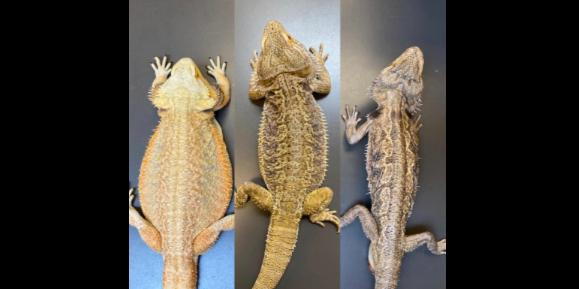
There is a misconception with bearded dragons that they are insectivores when they are actually omnivores (vegetable and meat-eaters). The over-feeding of protein sources can cause many health issues in bearded dragons, including obesity, skeletal malformations, and kidney disease. The appropriate diet for an adult bearded dragon is 80% fresh vegetables and 20% protein, fed once daily to every other day. The vegetables should be dark, leafy greens like dandelion greens, mustard greens, parsley, and chopped vegetables like squash, zucchini, bell pepper, etc. These vegetables are high in many vitamins and minerals, especially Vitamin A, which is important for the immune system and skin health. The bearded dragon should be fed 1-2 appropriately sized crickets or worms a couple of times a week, not every day. The vegetables should be dusted with calcium powder and the crickets/worms should be gut loaded with a highly nutritious diet prior to feeding. Without supplementing calcium in the diet, the reptile will not acquire enough needed for normal bodily functions. The bearded dragon also needs daily UVB light exposure in order to absorb this calcium. Without appropriate calcium and UVB, the bearded dragon will develop Metabolic Bone Disease. This is when the bones of the body are brittle, broken easily, and malformed due to low calcium. Progressive or chronic cases of low calcium can even cause neurologic signs like head tremors.
The picture above is a good representation of an obese bearded dragon (left), perfect body condition (center), and emaciated/underweight (right). Good body condition is determined by the pet having muscling of the limbs and along the spine, without the muscle bulging up over the spine or from the axillary and inguinal areas. If there is excess tissue bulging around the neck or base of the tail, then the pet is overweight. On the other hand, if the bones of the limbs and spine are obviously seen and palpated, then the patient is likely underweight. Goal weight depends on variations of the species but usually between 250-400 grams is appropriate.
Bearded dragons should be examined bi-annually to ensure they are of a healthy weight and normal physical exam. If you own a bearded dragon and you are worried about their body condition and weight, please make an appointment with Dr. Collins today!

